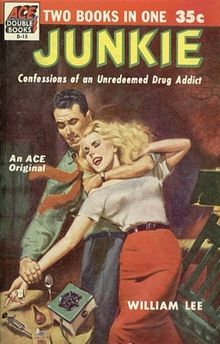 Before Burroughs decided his purpose in life was to beat the English language like a bitch who owed him money, he was writing things like this – a sane, lucid, and readable pulp novel about his addiction to heroin. Books about drugs often have a hallucinogenic quality, as if they’re trying to give the reader a second hand high. This isn’t like that. Burroughs is offering his body as a testing ground: he puts substances into it and writes about it in analytic terms.
Before Burroughs decided his purpose in life was to beat the English language like a bitch who owed him money, he was writing things like this – a sane, lucid, and readable pulp novel about his addiction to heroin. Books about drugs often have a hallucinogenic quality, as if they’re trying to give the reader a second hand high. This isn’t like that. Burroughs is offering his body as a testing ground: he puts substances into it and writes about it in analytic terms.
This was shocking in 1953. In 2015, not so much. Rich trust fund brat pulls the silver spoon from his mouth and starts cooking coke on it: stop the presses. Even if it’s not a pack of lies like A Million Little Pieces, the story is very familiar. I feel like I’m reading about a man’s disclosure of sexual envy and mid-life ennui. We get it. This is not special.
Its interesting if you want to know more about drug culture in America before Vietnam, Iran-Contra, crack cocaine, and all the rest. But really, not that much happens in it. Burroughs describes how he got involved with the scene, the interesting characters he met, and his occasional run-ins with the law. Beyond that, he doesn’t tell us much. This isn’t an exploration of man’s dark heart, it’s a police report.
Subsequent re-issues have tried to shoot steroids into the story with lurid, impressionistic cover art. But the original Ace Books cover art best captures the spirit of the tale: a man struggling with a woman, who has knocked a hypodermic syringe out of his hand. This is the most dramatic incident in the book, and even then it’s not all that interesting. Burroughs’ sexual proclivities are written about in the same dry way – he throws in off-handed mentions about boffing men, and then its back to scoring drugs. I was curious for more. These details about his life could have been expanded upon, and expounded upon. Instead, we get sketches.
But Junky has some moments where Burroughs really hits paydirt and gives us something good. I liked his description of being a drug addict. Paraphrased, it goes something like “I didn’t take drugs to get high. I took drugs to be functional. Heroin meant I could brush my teeth and shave myself and put on clean clothes. That was my high.” Pleasure operates at a tight Malthusian limit: no matter how much you dump into the brain, once a habit starts there will never be enough. I was reminded of a rotten.com article on crystal meth, and how quickly you degrade to a state where basic, mundane life is impossible without it.
Moments like that are chinks in the armor of Junky, and I wish there were more. Right now, it seems like a paradox – a tell-all book that tells almost nothing. I was hoping for more insights, more details, more specifics on what it’s like to be a man like Burroughs in the 1950s. I wonder if the good stuff was left on the cutting room floor: this was a different age for publishing, just as it was for everything else.
I suppose you could argue that Burroughs promotes a positive social message by making drugs look boring.
No Comments »
Comments are moderated and may take up to 24 hours to appear.
No comments yet.
